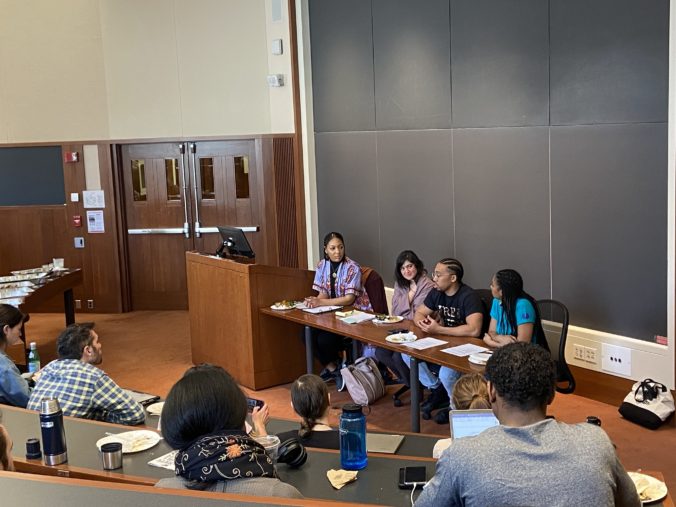On Monday March 9, PLAP hosted a discussion about conditions at Souza-Baranowski Correctional Center (SBCC) and throughout the Massachusetts prison system. The discussion was moderated by PLAP Liaison Alexis Yeboah-Kodie (JD ’21) and featured Elizabeth Matos, Executive Director of Prisoners’ Legal Services of Massachusetts; Jurrell Laronal, an abolitionist and community organizer who previously spent ten years incarcerated in Massachusetts prisons; and Ayana Aubourg, Director of Programs at Families for Justice as Healing and the Co-Founder/Co-Executive Director of Sisters Unchained.
The speakers began the discussion by detailing the widespread and brutal crackdown by officers at SBCC, which followed a fight on January 10th in which three officers were injured. As Matos put it, “What happened after January 10th, in our experience—and we’ve been around since 1972—was pretty unprecedented.” Starting around January 23rd, correctional officers, dressed in riot gear and accompanied by dogs, went cell-by-cell and assaulted people unprovoked. Over 120 assaults were reported to PLS in just five weeks; by comparison, only 44 assaults at SBCC were reported in the entire previous year. Laronal emphasized the severity of these attacks: “We’re not talking about small beatings. We’re talking about abuses. A lot of incarcerated people got sent out to outside hospitals.” Matos also noted that the assaults have contributed to a “huge mental health crisis” at SBCC. Furthermore, because all of the people involved in the January 10th altercation were moved to other prisons, all of these assaults at SBCC were against people who were not involved.
Laronal connected these recent assaults to a broader culture amongst officers that he experienced while he was incarcerated. As he put it, “Behind those walls, anything can happen…The culture that exists inside the prison system, with the guards, is that they can do whatever. It’s control with violence.” Matos also emphasized that these attacks were “state-sanctioned” and not the result of “a bunch of rogue officers.” Aubourg suggested that this behavior spurs from a narrative that “they’re locking up the worst of the worst people, but really they’re creating the worst of the worst conditions for people who are trying to survive prison.”
The speakers emphasized the burden that this crackdown has placed on families of incarcerated people. For a period of over a week after January 24th, people incarcerated at SBCC were only allowed out of their cells to shower and make phone calls for around 15 minutes total per day. They only had a brief amount of time during which to speak to their families about what they had experienced. Families of those who were sent to hospitals for treatment were not told where their loved ones were sent and could not communicate with them. As Aubourg put it, “It’s important to emphasize how the DOC is depriving families of human contact.”
Fortunately, the severity of this crackdown has spurred an impressive amount of organizing from community leaders like Matos, Laronal, and Aubourg. Organizers and families have pressured groups of state legislators to visit SBCC and investigate the conditions first-hand. State Senator Jamie Eldridge, for example, released a statement criticizing DOC for failing to improve conditions in line with the 2018 Criminal Justice Reform Act. Laronal emphasized that more sustained and rigorous pressure on elected officials can help to improve accountability: “If half of this room were to call their legislators, it would start an uproar.”
The speakers emphasized that SBCC cannot be addressed in a vacuum: for real change to occur, the culture of violence and abuse needs to be addressed throughout the Department of Correction. The same agency that is turning a blind eye to the crisis at SBCC is also pushing to build a new $50 million women’s prison. DOC is thus seeking to redirect resources away from rehabilitation and community-based programs. The public attention focused on SBCC provides an opportunity to push Beacon Hill for a real change in how it spends resources. As Matos put it, “For so long this has been out of sight and out of mind and people just haven’t cared. Now we have an opportunity.”
